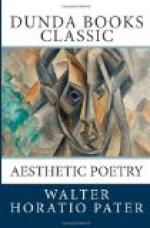That monastic religion of the Middle Age was, in fact, in many of its bearings, like a beautiful disease or disorder of the senses: and a religion which is a disorder of the senses must always be subject to illusions. Reverie, illusion, delirium: they are the three stages of a fatal descent both in the religion and the loves of the Middle Age. Nowhere has the impression of this delirium been conveyed as by Victor Hugo in Notre Dame de Paris. The [218] strangest creations of sleep seem here, by some appalling licence, to cross the limit of the dawn. The English poet too has learned the secret. He has diffused through King Arthur’s Tomb the maddening white glare of the sun, and tyranny of the moon, not tender and far-off, but close down—the sorcerer’s moon, large and feverish. The colouring is intricate and delirious, as of “scarlet lilies.” The influence of summer is like a poison in one’s blood, with a sudden bewildered sickening of life and all things. In Galahad: a Mystery, the frost of Christmas night on the chapel stones acts as a strong narcotic: a sudden shrill ringing pierces through the numbness: a voice proclaims that the Grail has gone forth through the great forest. It is in the Blue Closet that this delirium reaches its height with a singular beauty, reserved perhaps for the enjoyment of the few.
A passion of which the outlets are sealed, begets a tension of nerve, in which the sensible world comes to one with a reinforced brilliancy and relief—all redness is turned into blood, all water into tears. Hence a wild, convulsed sensuousness in the poetry of the Middle Age, in which the things of nature begin to play a strange delirious part. Of the things of nature the medieval mind had a deep sense; but its sense of them was not objective, no real escape [219] to the world without us. The aspects and motions of nature only reinforced its prevailing mood, and were in conspiracy with one’s own brain against one. A single sentiment invaded the world: everything was infused with a motive drawn from the soul. The amorous poetry of Provence, making the starling and the swallow its messengers, illustrates the whole attitude of nature in this electric atmosphere, bent as by miracle or magic to the service of human passion.
The most popular and gracious form of Provencal poetry was the nocturn, sung by the lover at night at the door or under the window of his mistress. These songs were of different kinds, according to the hour at which they were intended to be sung. Some were to be sung at midnight—songs inviting to sleep, the serena, or serenade; others at break of day—waking songs, the aube or aubade.* This waking-song is put sometimes into the mouth of a comrade of the lover, who plays sentinel during the night, to watch for and announce the dawn: sometimes into the mouth of one of the lovers, who are about to separate. A modification of it is familiar to us all in Romeo and Juliet, where the




